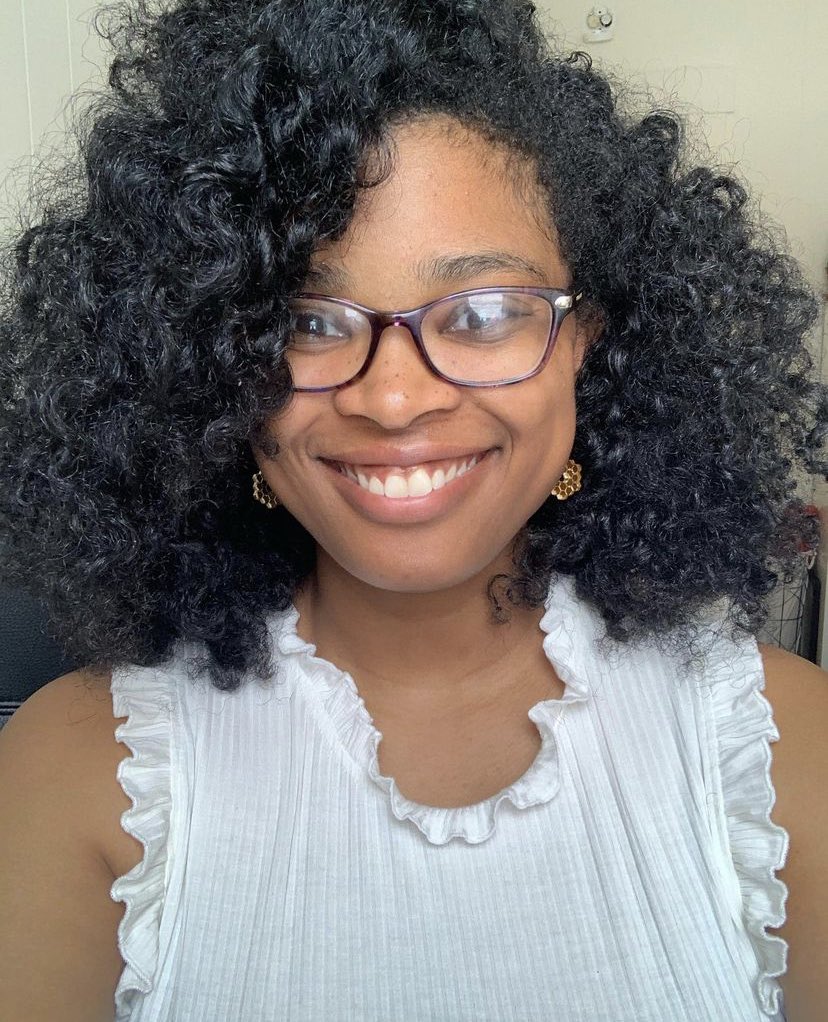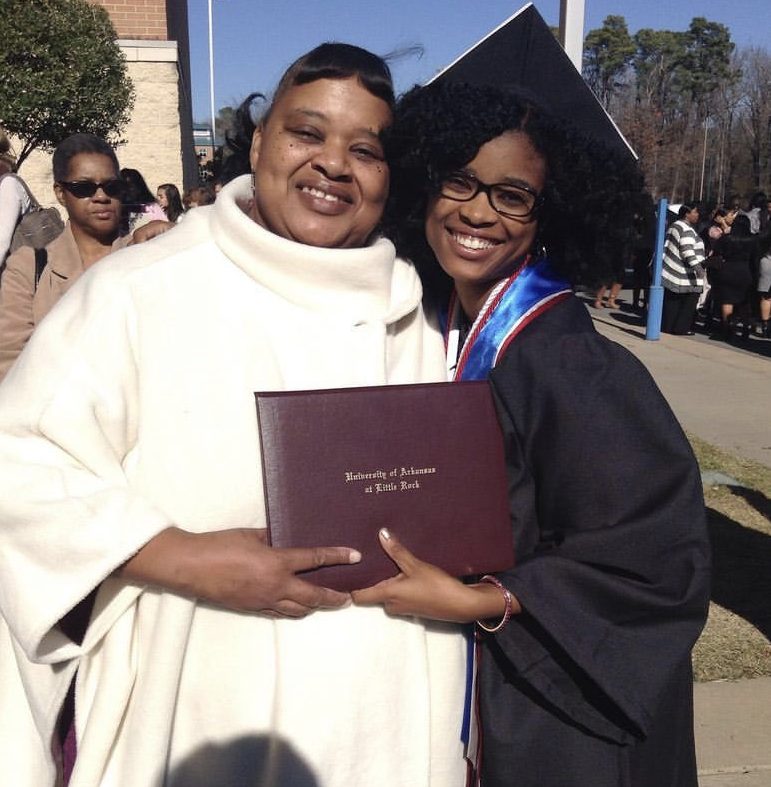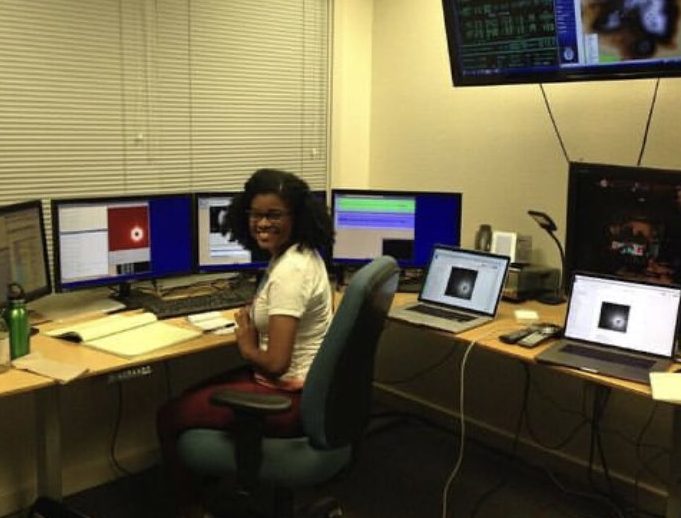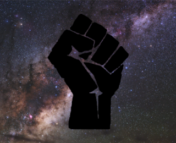It’s #BlackInAstroWeek2021 June 20th to June 26th! Find out more and follow along at blackinastro.com and @BlackInAstro on Twitter. This post is also part of our ongoing series #BlackInAstro. For our cornerstone post, see here.
“Let’s get this bread”

Caprice Phillips has been facing obstacles since before she even started her astronomy career.
“My mom was the one that saw that I was interested in the moon,” she says. “So she got me my first little telescope, a little cheap one from JC Penney—you could basically [only] look into trees with it […] I would take it out on our street and try to look at stars. I knew I wanted to study space, I just didn’t know how you did that. I had no idea how to even get there, and I didn’t see people around me that looked like me doing that stuff.”
But even once Phillips knew what she wanted to do, her path wasn’t easy. “I went to a really small school in Arkansas, so we didn’t have a lot of research opportunities,” she says. She wanted to major in astronomy, but her school didn’t have an astronomy major or minor. Phillips was told to major in physics instead, since astronomy was basically applied physics. “So I thought, okay, let’s get this bread.”

She started working on a small astronomy research project, but “the professor left the school and took all the astronomy research with him. I thought that was the end of my astronomy [career],” she says. Fortunately, she was able to end up participating in the McNair Scholars program. “I started doing smaller astronomy projects that way. I did a research project on meteorites, and that’s how I first got introduced to exoplanets. I never traditionally did an REU. I didn’t even know about them, and by the time I knew about it, it was too late for me. It was such a small school, and nobody really told me about them.”
Phillips has managed to succeed in spite of all these challenges. She’s now a second-year PhD student at the Ohio State University, where she studies gas dwarfs—exoplanets that are bigger than Earth, but not as big as Neptune. These exoplanets are ideal places to look for ammonia, which can be a potential biosignature in hydrogen-dominated atmospheres.
“In a hydrogen-dominated atmosphere, the idea is that microbes can […] produce ammonia,” Phillips explains. “It’s hard to produce ammonia abiotically under certain temperatures and pressures. So if we see it in habitable temperatures and pressures, it could be a sign that there could be lifeforms there—or at least we could start to look at other processes, to try to rule out other abiotic sources.” But not all of them have the right size or equilibrium temperature to be good candidates for ammonia signatures. The upcoming JWST might be able to observe ammonia features in gas dwarf atmospheres for the first time, so Phillips’ work focuses on simulating near-infrared spectra of these objects and making mock JWST observations.
Being Black in Astro
Phillips is one of the organizers of #BlackInAstro, which is working to promote and support Black people in the space sciences, including astronomy. “We’ve always been interested in astronomy. It’s just about allies being supportive and helping keep people in the pipeline,” she says.
As Phillips knows from first-hand experience, lack of support is a major factor in discouraging or actively pushing Black astronomers out of the field. “I finally landed at a spot that was supportive of me, but that wasn’t the case when I first started out,” she says. “I lucked out that I’m at a place now with a super supportive environment, but that’s not the case for everyone.”
In particular, she says, support from advisors and mentors is important: “An advisor makes a world of difference. They’re the ones who help shape your future and give you advice.” What exactly does a good advisor do? “A supportive advisor puts opportunities [in your path.] They’re advocating for you in different spaces—like ‘oh, I want you to meet this person,’ or ‘oh, there’s this cool conference I want you to go to,’ or ‘how are you doing today?’” Phillips says. “It’s the way they give feedback, it’s the way that they answer questions. It’s them acknowledging that you’re a whole person with whole emotions, and academia is not just your entire life.”
As an example of such an acknowledgment, Phillips describes her advisor: “I’ve been going through a lot of things, and my current advisor is like ‘if you need time off, I totally understand. Research will always be there, just making sure you’re alright.’ Things like that—not making you feel bad, or that you’re not cut out for this because you’re going through things. Recognizing that mental health is important and trying to find resources for you, all these different things—to me, that’s what makes a supportive person and a supportive environment.”
Phillips emphasizes that other people, not just advisors, also help make inclusive environments. She points to networks she’s been able to build outside of her department that have helped support her, such as through the LSSTC Data Science Fellowship. For non-Black peers, she says, it’s important to “keep their fellow white students and white colleagues in check and be the ones to call them out on things. And to keep themselves in check as well—question assumptions they might have, or the ways in which they ask questions of marginalized students.”
“I know it’s easier said than done,” she acknowledges, “but at the end of the day they’re gonna be fine if they get called out or whatever, they get to go home and wipe it off. But we can’t stop being Black!”
Advice to a younger Caprice
If she could go back and give herself advice, what would she say? “To young Caprice… I would tell her to listen to her instincts. With past people in my life, I was just so happy to be at a certain place or a certain institution […] I felt like I wasn’t deserving of being here, that I ignored a lot of bad warning signs about people and environments.”
But she’s learned better since then. “I deserve to be here! I worked hard just like anybody else,” she says. “I would tell myself: ‘Everybody around you seems so brilliant and so smart—it’s because (A) they’ve got 20 years of experience, and (B) they already come from places of privilege where they were able to get tutors or go to schools that had more opportunities. That wasn’t the case for you. And that’s okay! It’s okay not to be where you feel everybody else is at, it’s just a different experience.’”

To learn more about Caprice Phillips, check out her Twitter!
Astrobite edited by Luna Zagorac
Featured image credit: Astrobites collaboration

